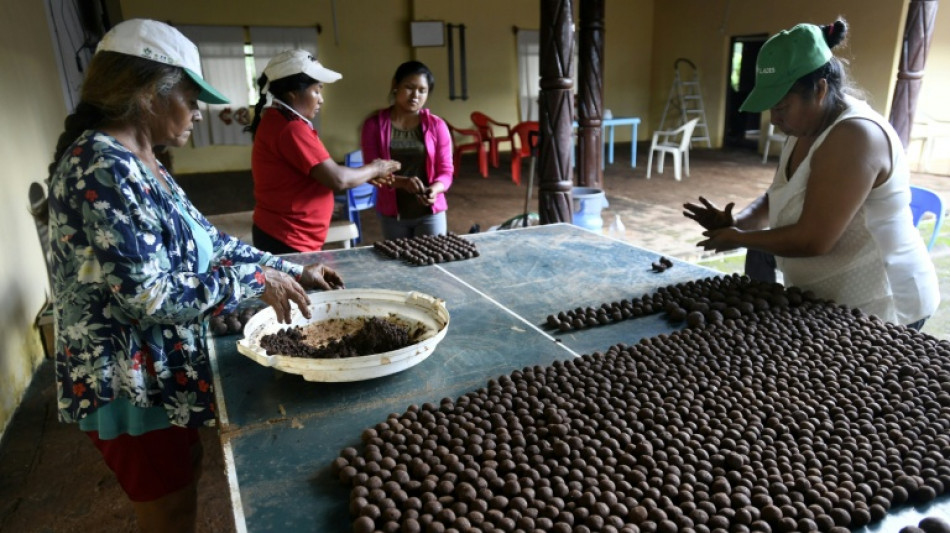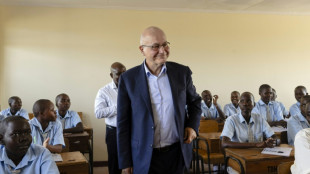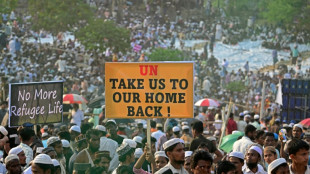
-
 India and Germany eye defence industry boost to ties
India and Germany eye defence industry boost to ties
-
'I know the pain': ex-refugee takes over as UNHCR chief

-
 US prosecutors open criminal probe into Federal Reserve
US prosecutors open criminal probe into Federal Reserve
-
Rohingya 'targeted for destruction' by Myanmar, ICJ hears

-
 'Genius' chimpanzee Ai dies in Japan at 49
'Genius' chimpanzee Ai dies in Japan at 49
-
Trump says US will take Greenland 'one way or the other'

-
 Asian equities, precious metals surge as US Justice Dept targets Fed
Asian equities, precious metals surge as US Justice Dept targets Fed
-
Myanmar pro-military party claims Suu Kyi's seat in junta-run poll

-
 Fed chair Powell says targeted by federal probe
Fed chair Powell says targeted by federal probe
-
Trailblazing Milos Raonic retires from tennis

-
 Australia recalls parliament early to pass hate speech, gun laws
Australia recalls parliament early to pass hate speech, gun laws
-
'One Battle After Another,' 'Hamnet' triumph at Golden Globes

-
 Japan aims to dig deep-sea rare earths to reduce China dependence
Japan aims to dig deep-sea rare earths to reduce China dependence
-
Top UN court to hear Rohingya genocide case against Myanmar

-
 US sends more agents to Minneapolis despite furor over woman's killing
US sends more agents to Minneapolis despite furor over woman's killing
-
Trump says Iran 'want to negotiate' after reports of hundreds killed in protests

-
 Bangladesh's powerful Islamists prepare for elections
Bangladesh's powerful Islamists prepare for elections
-
NBA-best Thunder beat the Heat as T-Wolves edge Spurs

-
 Ukraine's Kostyuk defends 'conscious choice' to speak out about war
Ukraine's Kostyuk defends 'conscious choice' to speak out about war
-
Trump says working well with Venezuela's new leaders, open to meeting

-
 Asian equities edge up, dollar slides as US Fed Reserve subpoenaed
Asian equities edge up, dollar slides as US Fed Reserve subpoenaed
-
Hong Kong court hears sentencing arguments for Jimmy Lai

-
 Powell says Federal Reserve subpoenaed by US Justice Department
Powell says Federal Reserve subpoenaed by US Justice Department
-
Chalamet, 'One Battle' among winners at Golden Globes

-
 Turning point? Canada's tumultuous relationship with China
Turning point? Canada's tumultuous relationship with China
-
Eagles stunned by depleted 49ers, Allen leads Bills fightback

-
 Globes red carpet: chic black, naked dresses and a bit of politics
Globes red carpet: chic black, naked dresses and a bit of politics
-
Maduro's fall raises Venezuelans' hopes for economic bounty

-
 Golden Globes kick off with 'One Battle' among favorites
Golden Globes kick off with 'One Battle' among favorites
-
Australian Open 'underdog' Medvedev says he will be hard to beat

-
 In-form Bencic back in top 10 for first time since having baby
In-form Bencic back in top 10 for first time since having baby
-
Swiatek insists 'everything is fine' after back-to-back defeats

-
 Wildfires spread to 15,000 hectares in Argentine Patagonia
Wildfires spread to 15,000 hectares in Argentine Patagonia
-
Napoli stay in touch with leaders Inter thanks to talisman McTominay

-
 Meta urges Australia to change teen social media ban
Meta urges Australia to change teen social media ban
-
Venezuelans await political prisoners' release after government vow

-
 Lens continue winning streak, Endrick opens Lyon account in French Cup
Lens continue winning streak, Endrick opens Lyon account in French Cup
-
McTominay double gives Napoli precious point at Serie A leaders Inter

-
 Trump admin sends more agents to Minneapolis despite furor over woman's killing
Trump admin sends more agents to Minneapolis despite furor over woman's killing
-
Allen magic leads Bills past Jaguars in playoff thriller

-
 Barca edge Real Madrid in thrilling Spanish Super Cup final
Barca edge Real Madrid in thrilling Spanish Super Cup final
-
Malinin spearheads US Olympic figure skating challenge

-
 Malinin spearheads US figure Olympic figure skating challenge
Malinin spearheads US figure Olympic figure skating challenge
-
Iran rights group warns of 'mass killing', govt calls counter-protests

-
 'Fragile' Man Utd hit new low with FA Cup exit
'Fragile' Man Utd hit new low with FA Cup exit
-
Iran rights group warns of 'mass killing' of protesters

-
 Demonstrators in London, Paris, Istanbul back Iran protests
Demonstrators in London, Paris, Istanbul back Iran protests
-
Olise sparkles as Bayern fire eight past Wolfsburg

-
 Man Utd knocked out of FA Cup by Brighton, Martinelli hits hat-trick for Arsenal
Man Utd knocked out of FA Cup by Brighton, Martinelli hits hat-trick for Arsenal
-
Troubled Man Utd crash out of FA Cup against Brighton


Burn land or plant trees? Bolivian farmers weigh their options
Less than a year after the worst wildfires in Bolivia's history, farmers face a choice: continue starting blazes to clear land for agriculture, or plant trees to mitigate worsening droughts.
Around 10.7 million hectares (26.4 million acres) of dry tropical forest -- an area about the size of Portugal -- went up in smoke in Bolivia's eastern lowlands last year, according to the non-profit Bolivian Institute for Forest Research (IBIF).
While the fires received less attention than those across the border in Brazil, they killed at least four people, according to Bolivian authorities, and churned up record carbon pollution, the European Union's climate monitor said.
Attempts to carry out controlled burns were widely blamed for the infernos, which spread quickly in a region parched by a prolonged drought that scientists attribute to climate change.
Julia Ortiz, a sesame grower, knows all too well the hazards of the "chaqueos" (slash-and-burn agriculture) practiced by farmers big and small in Bolivia, particularly in the tropical grasslands of Chiquitania region.
Five years ago, she and her family spent an entire night trying to bring a fire they had themselves set under control.
"It can happen to anybody. Most of us live off farming and we must do burns," the 46-year-old Indigenous farmer said as she harvested her plants and stacked them in the sun to dry.
Last year's fires were of a much greater magnitude.
Carmen Pena, a 59-year-old resident of Santa Ana de Velasco, a village with dirt roads surrounded by forest and prairies, lost her banana and yuca crops.
"I don't know how we will survive because our food is running out," said Pena, who like most of Santa Ana's residents depends entirely on farming for an income.
- No machinery -
As green shoots start to sprout from fire-scarred earth, new fires are being lit in other areas as some farmers in Santa Ana continue to clear vegetation to grow crops.
Charred tree trunks on Ortiz's land point to a recent fire, even as the community embarks on a major tree-planting program.
According to an IBIF report, 63.6 percent of the land damaged by last year's fires was in forested areas, which it said pointed to "strong pressure to expand the boundaries of farmland."
David Cruz, a climate change specialist at the Universidad Mayor de San Andres in Bolivia's capital La Paz, accuses the state of abetting deforestation by pardoning people found responsible for starting fires, giving farmers extensions on deadlines to comply with environmental regulations and allowing them to burn large tracts of land.
Ortiz argues that fires are the only way farmers have of clearing land, in the absence of machinery to bury felled trees.
"If we had tractors, we would not need to do burns," she said.
But neither she nor her 1,700 fellow villagers can afford to rent a tractor, much less buy one, and those belonging to the municipality are all undergoing repairs.
"That's why we work as we do, running the risk that the fire would rage out of control. But it's the only choice we have," she argued.
- Tree-planting 'bombs' -
Faced with ongoing water shortages, which is causing crops to wither in the fields, a group of local women -- most of the men have left the village to find work -- have joined forces to try to replant trees using a method pioneered in Nepal.
Using their hands they knead "bombitas" (little spheres) of earth, which they fill with the seeds of indigenous trees.
Drones are then used to drop them over 500 hectares of deforested land, with funding from the Swiss NGO Swisscontact and Bolivia's own Flades foundation.
Some 250,000 "bombitas' will be airdropped starting in March.
Similar reforestation techniques have also been used in Peru and Brazil.
"Without forests, we'll have no water," Joaquin Sorioco, a farmer and forestry technician in Santa Ana said, expressing hope that the planting "will help (the soil) retain more humidity."
The Flades foundation hopes that last year's fires served as a wake-up call on the ravages of land-clearing practices.
"We went through very difficult times," the foundation's director Mario Rivera said. "But in a way it helped create awareness."
U.Shaheen--SF-PST



